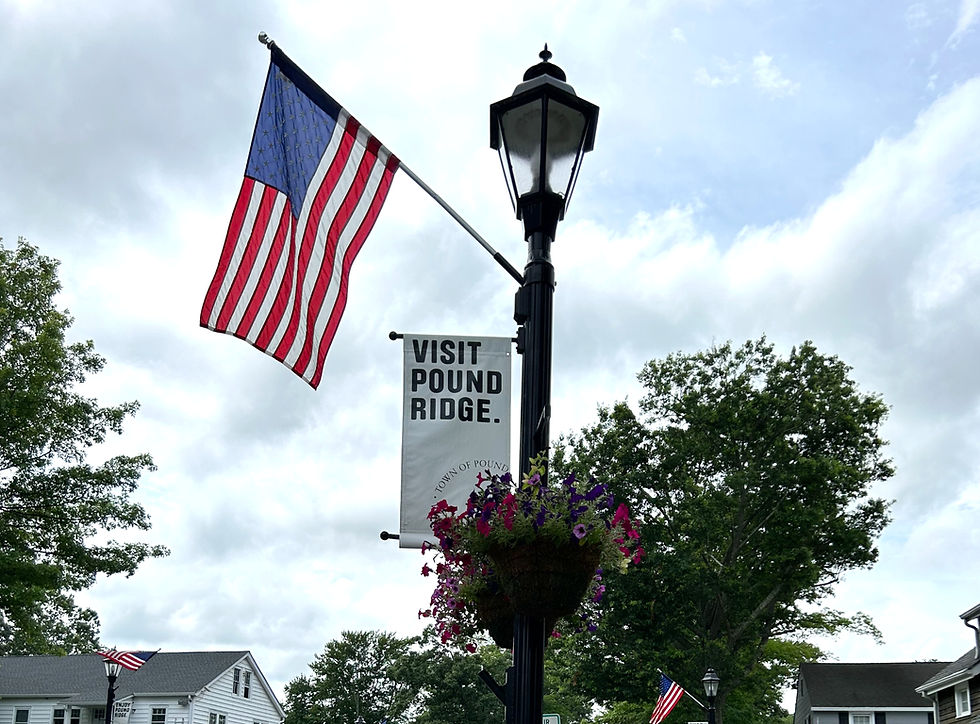Guest Column: A life free from domestic abuse
- Thane Grauel

- Oct 25, 2024
- 4 min read
By PATTI D’AGOSTINO
Does any of this look familiar? Have you noticed the purple ribbons and wondered what awareness month it is? Or maybe you saw a whole lot of people wearing purple on “Purple Thursday” last week and wondered what kind of statement this was? Or perhaps none of this sounds remotely familiar? As your neighbor and resident of Pound Ridge for nearly three decades, let me walk you through this.#DVAM: October is Domestic Violence Awareness Month — yes, it’s also Breast Cancer Awareness and Mental Health Awareness months. This isn’t a coincidence; they’re actually related.
Let’s start with the basics. Domestic violence encompasses a pattern of abusive behavior, used over time for the sole purpose of controlling an intimate partner. The ebb and flow of the pattern creates the cycle of abuse. This cycle makes you rationalize, minimize and forgive this person you love all the while believing their lies, trusting it was just a mistake and slowly allowing oneself to get smaller. Abusive behavior can include emotional, psychological, financial, sexual, physical, digital, stalking and reproductive coercion. Experiencing traumatic events, such as physical and sexual violence, is associated with a range of adverse physical and mental health consequences.
Given that October is also Breast Cancer Awareness Month, according to a 2006 study on the National Institute of Health’s website, a history of violence in breast cancer patients was not only common, it also correlated with diagnosis at an advanced stage of cancer. Moreover, there is a link between domestic violence and an increased risk for post-traumatic stress disorder, depression and suicide, according to psychiatry.org.
#Every1KnowsSome1: It’s a statistical fact. One in four women, one in seven men, have been the victim of severe physical abuse by an intimate partner in their lifetime. The highest rate of intimate partner violence is for young women between the ages of 16 to 24. That means that at a time when they are expanding their worlds, experiencing life on their own, that’s when they are the most vulnerable to abuse. Abuse can happen to anyone regardless of race, gender, sexual orientation or financial means. I personally know of 10 victims of abuse from our communities in northern Westchester, including Pound Ridge, Bedford, Mount Kisco, South Salem and Katonah; one lost their life, alongside their daughter, at the hands of their abuser.Look around you the next time you’re at the market, the soccer field, the nail salon, in a meeting or even at a party. One in four.#YouAreNotAlone: Or are you? Being a victim of abuse can be one of the most isolating times of a person’s life.
“I would hope to feel loved but mostly I need to be liked and accepted. I don’t like being hated for who I am or the things that have happened to me that are not in my control, like cancer and old parents. I would like to wake up and know that I have a home instead of feeling that I’m on borrowed time. I want peace in my life.” These words were scribbled on a piece of paper by a victim of abuse while she hid in her closet from her husband of 25 years. Suffering from over two decades of varying types of abuse — emotional, psychological, financial and physical, she lived in fear. Fear of when he would explode, fear of what he would ruin and fear of existing in that reality.#IYKYK: If You Know You Know. How do I know this? Chalk it up to lived experience or my work at Hope’s Door. The fact is, I know and now you do, too.
So how do we end domestic violence? There are many ways to be part of the solution. Start with supporting those that do the work: volunteer, attend an event, donate, sponsor an event, or make a donation-in-kind (that’s when you can provide a product or a service for free). For over four decades, Hope’s Door has been dedicated to helping victims of domestic violence through free and confidential services, providing emergency shelter, counseling, youth prevention education and legal services, in support of their mission to end domestic violence and empower victims to achieve safety, independence and healing from the trauma of abuse.
Lastly, I leave you with the acronym HOPE to guide your efforts in being a community member that will stand against domestic violence and plant a seed of hope for a future without abuse.
Helping is listening; it offers friendship and emotional support.
Opening the doors to the possibility of a life free from abuse takes time and patience.
Perspective. No matter the good intentions you may have, you likely won’t understand the point of view of someone experiencing abuse. That’s why it’s critical that one not be judgmental.
Educate yourself, educate your loved ones, educate your friends. The more we talk about domestic abuse, the more likely someone you know will come forward for help. Silence is an abuser’s power.
Hope’s Door offers free and confidential services for anyone who may be experiencing domestic violence, intimate partner violence or any other forms of abuse. If you or a friend or family member are living with abuse, please visit hopesdoorny.org.
Patti D’Agostino is director of development at Hope’s Door.






![CA-Recorder-Mobile-CR-2025[54].jpg](https://static.wixstatic.com/media/09587f_b989949ec9bc46d8b6ea89ecc2418a8a~mv2.jpg/v1/fill/w_370,h_150,al_c,q_80,enc_avif,quality_auto/CA-Recorder-Mobile-CR-2025%5B54%5D.jpg)





